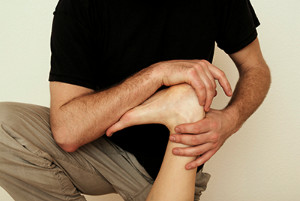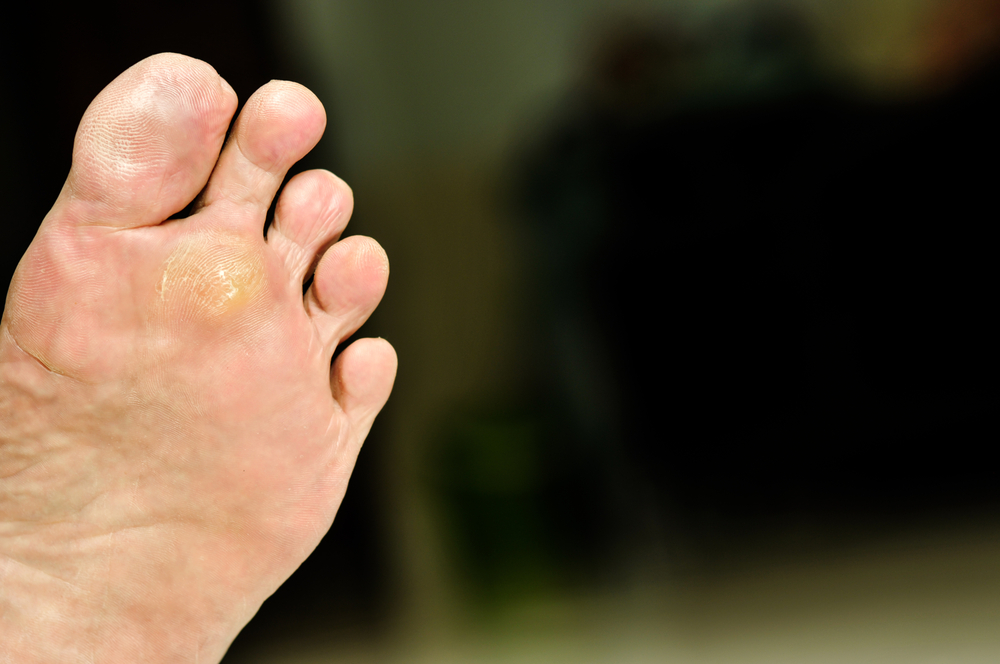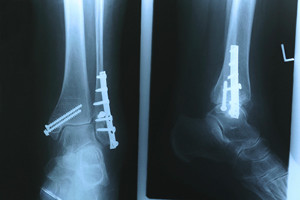Items filtered by date: February 2020
The Benefits of Frequently Stretching the Feet
 Many patients overlook their feet when it comes to stretching the body. The feet are considered to be the foundation of the body, which is why the overall health of the body may improve when the feet are healthy and flexible. The benefits that are associated with stretching the feet can include improved muscle tone, and cardiovascular health and circulation may become more efficient. Walking is considered to be a good way to stretch the feet. This is due to the full range of motion that is achieved as each step is taken. The toes can be stretched by crossing one leg over the other while pulling the toes back. When several repetitions of this are completed, switch legs. An effective Achilles tendon stretch happens when your hands are placed on a wall in front of you while simultaneously stepping back with one foot. After feeling a gentle stretch, hold for thirty seconds. If you would like additional information about the importance of stretching the feet, please consult with a podiatrist.
Many patients overlook their feet when it comes to stretching the body. The feet are considered to be the foundation of the body, which is why the overall health of the body may improve when the feet are healthy and flexible. The benefits that are associated with stretching the feet can include improved muscle tone, and cardiovascular health and circulation may become more efficient. Walking is considered to be a good way to stretch the feet. This is due to the full range of motion that is achieved as each step is taken. The toes can be stretched by crossing one leg over the other while pulling the toes back. When several repetitions of this are completed, switch legs. An effective Achilles tendon stretch happens when your hands are placed on a wall in front of you while simultaneously stepping back with one foot. After feeling a gentle stretch, hold for thirty seconds. If you would like additional information about the importance of stretching the feet, please consult with a podiatrist.
Stretching the feet is a great way to prevent injuries. If you have any concerns with your feet consult with Harvey Jacobs, DPM from Quality Foot Care Center. Our doctor will assess your condition and provide you with quality foot and ankle treatment.
Stretching the Feet
Stretching the muscles in the foot is an important part in any physical activity. Feet that are tight can lead to less flexibility and make you more prone to injury. One of the most common forms of foot pain, plantar fasciitis, can be stretched out to help ease the pain. Stretching can not only ease pain from plantar fasciitis but also prevent it as well. However, it is important to see a podiatrist first if stretching is right for you. Podiatrists can also recommend other ways to stretch your feet. Once you know whether stretching is right for you, here are some excellent stretches you can do.
- Using a foam roller or any cylindrical object (a water bottle or soda can will do), roll the object under your foot back and forth. You should also exert pressure on the object. Be sure to do this to both feet for a minute. Do this exercise three times each.
- Similar to the previous one, take a ball, such as a tennis ball, and roll it under your foot while seated and exert pressure on it.
- Grab a resistance band or towel and take a seat. If you are using a towel, fold it length wise. Next put either one between the ball of your foot and heel and pull with both hands on each side towards you. Hold this for 15 seconds and then switch feet. Do this three times for each foot.
- Finally hold your big toe while crossing one leg over the other. Pull the toe towards you and hold for 15 seconds. Once again do this three times per foot.
It is best to go easy when first stretching your foot and work your way up. If your foot starts hurting, stop exercising and ice and rest the foot. It is advised to then see a podiatrist for help.
If you have any questions, please feel free to contact our office located in Somerset, NJ . We offer the newest diagnostic and treatment technologies for all your foot care needs.
The Benefits of Frequently Stretching the Feet
 Many patients overlook their feet when it comes to stretching the body. The feet are considered to be the foundation of the body, which is why the overall health of the body may improve when the feet are healthy and flexible. The benefits that are associated with stretching the feet can include improved muscle tone, and cardiovascular health and circulation may become more efficient. Walking is considered to be a good way to stretch the feet. This is due to the full range of motion that is achieved as each step is taken. The toes can be stretched by crossing one leg over the other while pulling the toes back. When several repetitions of this are completed, switch legs. An effective Achilles tendon stretch happens when your hands are placed on a wall in front of you while simultaneously stepping back with one foot. After feeling a gentle stretch, hold for thirty seconds. If you would like additional information about the importance of stretching the feet, please consult with a podiatrist.
Many patients overlook their feet when it comes to stretching the body. The feet are considered to be the foundation of the body, which is why the overall health of the body may improve when the feet are healthy and flexible. The benefits that are associated with stretching the feet can include improved muscle tone, and cardiovascular health and circulation may become more efficient. Walking is considered to be a good way to stretch the feet. This is due to the full range of motion that is achieved as each step is taken. The toes can be stretched by crossing one leg over the other while pulling the toes back. When several repetitions of this are completed, switch legs. An effective Achilles tendon stretch happens when your hands are placed on a wall in front of you while simultaneously stepping back with one foot. After feeling a gentle stretch, hold for thirty seconds. If you would like additional information about the importance of stretching the feet, please consult with a podiatrist.
Stretching the feet is a great way to prevent injuries. If you have any concerns with your feet consult with one of our podiatrists from Quality Foot Care Center. Our doctors will assess your condition and provide you with quality foot and ankle treatment.
Stretching the Feet
Stretching the muscles in the foot is an important part in any physical activity. Feet that are tight can lead to less flexibility and make you more prone to injury. One of the most common forms of foot pain, plantar fasciitis, can be stretched out to help ease the pain. Stretching can not only ease pain from plantar fasciitis but also prevent it as well. However, it is important to see a podiatrist first if stretching is right for you. Podiatrists can also recommend other ways to stretch your feet. Once you know whether stretching is right for you, here are some excellent stretches you can do.
- Using a foam roller or any cylindrical object (a water bottle or soda can will do), roll the object under your foot back and forth. You should also exert pressure on the object. Be sure to do this to both feet for a minute. Do this exercise three times each.
- Similar to the previous one, take a ball, such as a tennis ball, and roll it under your foot while seated and exert pressure on it.
- Grab a resistance band or towel and take a seat. If you are using a towel, fold it length wise. Next put either one between the ball of your foot and heel and pull with both hands on each side towards you. Hold this for 15 seconds and then switch feet. Do this three times for each foot.
- Finally hold your big toe while crossing one leg over the other. Pull the toe towards you and hold for 15 seconds. Once again do this three times per foot.
It is best to go easy when first stretching your foot and work your way up. If your foot starts hurting, stop exercising and ice and rest the foot. It is advised to then see a podiatrist for help.
If you have any questions, please feel free to contact our office located in Somerset, NJ. We offer the newest diagnostic and treatment technologies for all your foot care needs.
Read more about Stretching Your FeetWhat to Do If You Develop a Corn
 To begin treating your corn, it is important to understand what pressure or friction caused its development in the first place. Typically, the main reasons for a corn to form can be from standing for the majority of the day on a hard surface, and wearing tight or ill-fitting shoes which restrict the toes. They may also develop due to previous or existing foot conditions such as a bunion. In order for a corn to go away, the pressure that caused it must first be removed. If this pressure is not removed, the skin will remain hardened and sensitive to the touch. To help prevent this condition, it’s recommended that you dry your feet thoroughly after washing them and apply a moisturizer. Regularly using a pumice stone to remove hardened skin may also help to keep the skin smooth. Most importantly, ensure that your footwear fits properly and comfortably, and provides your toes with an adequate amount of room. To safely remove your corn, it is advised that you consult with a podiatrist for professional care and treatment.
To begin treating your corn, it is important to understand what pressure or friction caused its development in the first place. Typically, the main reasons for a corn to form can be from standing for the majority of the day on a hard surface, and wearing tight or ill-fitting shoes which restrict the toes. They may also develop due to previous or existing foot conditions such as a bunion. In order for a corn to go away, the pressure that caused it must first be removed. If this pressure is not removed, the skin will remain hardened and sensitive to the touch. To help prevent this condition, it’s recommended that you dry your feet thoroughly after washing them and apply a moisturizer. Regularly using a pumice stone to remove hardened skin may also help to keep the skin smooth. Most importantly, ensure that your footwear fits properly and comfortably, and provides your toes with an adequate amount of room. To safely remove your corn, it is advised that you consult with a podiatrist for professional care and treatment.
Corns can make walking very painful and should be treated immediately. If you have questions regarding your feet and ankles, contact Harvey Jacobs, DPM of Quality Foot Care Center. Our doctor will treat your foot and ankle needs.
Corns: What Are They? And How Do You Get Rid of Them?
Corns are thickened areas on the skin that can become painful. They are caused by excessive pressure and friction on the skin. Corns press into the deeper layers of the skin and are usually round in shape.
Ways to Prevent Corns
There are many ways to get rid of painful corns such as:
- Wearing properly fitting shoes that have been measured by a professional
- Wearing shoes that are not sharply pointed or have high heels
- Wearing only shoes that offer support
Treating Corns
Although most corns slowly disappear when the friction or pressure stops, this isn’t always the case. Consult with your podiatrist to determine the best treatment option for your case of corns.
If you have any questions please feel free to contact our office located in Somerset, NJ . We offer the newest diagnostic and treatment technologies for all your foot and ankle needs.
What to Do If You Develop a Corn
 To begin treating your corn, it is important to understand what pressure or friction caused its development in the first place. Typically, the main reasons for a corn to form can be from standing for the majority of the day on a hard surface, and wearing tight or ill-fitting shoes which restrict the toes. They may also develop due to previous or existing foot conditions such as a bunion. In order for a corn to go away, the pressure that caused it must first be removed. If this pressure is not removed, the skin will remain hardened and sensitive to the touch. To help prevent this condition, it’s recommended that you dry your feet thoroughly after washing them and apply a moisturizer. Regularly using a pumice stone to remove hardened skin may also help to keep the skin smooth. Most importantly, ensure that your footwear fits properly and comfortably, and provides your toes with an adequate amount of room. To safely remove your corn, it is advised that you consult with a podiatrist for professional care and treatment.
To begin treating your corn, it is important to understand what pressure or friction caused its development in the first place. Typically, the main reasons for a corn to form can be from standing for the majority of the day on a hard surface, and wearing tight or ill-fitting shoes which restrict the toes. They may also develop due to previous or existing foot conditions such as a bunion. In order for a corn to go away, the pressure that caused it must first be removed. If this pressure is not removed, the skin will remain hardened and sensitive to the touch. To help prevent this condition, it’s recommended that you dry your feet thoroughly after washing them and apply a moisturizer. Regularly using a pumice stone to remove hardened skin may also help to keep the skin smooth. Most importantly, ensure that your footwear fits properly and comfortably, and provides your toes with an adequate amount of room. To safely remove your corn, it is advised that you consult with a podiatrist for professional care and treatment.
Corns can make walking very painful and should be treated immediately. If you have questions regarding your feet and ankles, contact one of our podiatrists of Quality Foot Care Center. Our doctors will treat your foot and ankle needs.
Corns: What Are They? And How Do You Get Rid of Them?
Corns are thickened areas on the skin that can become painful. They are caused by excessive pressure and friction on the skin. Corns press into the deeper layers of the skin and are usually round in shape.
Ways to Prevent Corns
There are many ways to get rid of painful corns such as:
- Wearing properly fitting shoes that have been measured by a professional
- Wearing shoes that are not sharply pointed or have high heels
- Wearing only shoes that offer support
Treating Corns
Although most corns slowly disappear when the friction or pressure stops, this isn’t always the case. Consult with your podiatrist to determine the best treatment option for your case of corns.
If you have any questions please feel free to contact our office located in Somerset, NJ. We offer the newest diagnostic and treatment technologies for all your foot and ankle needs.
Read more about Understanding Corns and CallusesKeeping Your Child’s Feet Healthy
 To help prevent the development of foot-related complications, it’s important to manage and maintain the health of your child’s feet at an early age. Examining your child’s feet for any abnormalities or wounds can help in providing an early diagnosis of an existing foot condition, as well as prevent possible conditions from worsening. Having children wear socks or booties that are too tight for their feet may cause harm and actually reduce the natural development of their feet if worn too often. Allowing for your child to be shoeless indoors may help in building the muscles of the foot, and strengthen their feet. Keeping their feet dry, clean, and their toenails properly trimmed are all vital for the prevention of common foot conditions, such as ingrown toenails. Maintaining proper foot hygiene for your child can help to set a great example for how they should care for their feet as they get older. For more information on how to help keep your child’s feet healthy, please consult with a podiatrist.
To help prevent the development of foot-related complications, it’s important to manage and maintain the health of your child’s feet at an early age. Examining your child’s feet for any abnormalities or wounds can help in providing an early diagnosis of an existing foot condition, as well as prevent possible conditions from worsening. Having children wear socks or booties that are too tight for their feet may cause harm and actually reduce the natural development of their feet if worn too often. Allowing for your child to be shoeless indoors may help in building the muscles of the foot, and strengthen their feet. Keeping their feet dry, clean, and their toenails properly trimmed are all vital for the prevention of common foot conditions, such as ingrown toenails. Maintaining proper foot hygiene for your child can help to set a great example for how they should care for their feet as they get older. For more information on how to help keep your child’s feet healthy, please consult with a podiatrist.
The health of a child’s feet is vital to their overall well-being. If you have any questions regarding foot health, contact Harvey Jacobs, DPM of Quality Foot Care Center. Our doctor can provide the care you need to keep you pain-free and on your feet.
Tips for Keeping Children's Feet Healthy
- Make sure their shoes fit properly
- Look for any signs of in-toeing or out-toeing
- Check to see if they have Clubfoot (condition that affects your child’s foot and ankle, twisting the heel and toes inward) which is one of the most common nonmajor birth defects.
- Lightly cover your baby’s feet (Tight covers may keep your baby from moving their feet freely, and could prevent normal development)
- Allow your toddler to go shoeless (Shoes can be restricting for a young child’s foot)
- Cut toenails straight across to avoid ingrown toenails
- Keep your child’s foot clean and dry
- Cover cuts and scrapes. Wash any scratches with soap and water and cover them with a bandage until they’ve healed.
If you have any questions, please feel free to contact our office located in Somerset, NJ . We offer the newest diagnostic and treatment technologies for all your foot care needs.
Keeping Your Child’s Feet Healthy
 To help prevent the development of foot-related complications, it’s important to manage and maintain the health of your child’s feet at an early age. Examining your child’s feet for any abnormalities or wounds can help in providing an early diagnosis of an existing foot condition, as well as prevent possible conditions from worsening. Having children wear socks or booties that are too tight for their feet may cause harm and actually reduce the natural development of their feet if worn too often. Allowing for your child to be shoeless indoors may help in building the muscles of the foot, and strengthen their feet. Keeping their feet dry, clean, and their toenails properly trimmed are all vital for the prevention of common foot conditions, such as ingrown toenails. Maintaining proper foot hygiene for your child can help to set a great example for how they should care for their feet as they get older. For more information on how to help keep your child’s feet healthy, please consult with a podiatrist.
To help prevent the development of foot-related complications, it’s important to manage and maintain the health of your child’s feet at an early age. Examining your child’s feet for any abnormalities or wounds can help in providing an early diagnosis of an existing foot condition, as well as prevent possible conditions from worsening. Having children wear socks or booties that are too tight for their feet may cause harm and actually reduce the natural development of their feet if worn too often. Allowing for your child to be shoeless indoors may help in building the muscles of the foot, and strengthen their feet. Keeping their feet dry, clean, and their toenails properly trimmed are all vital for the prevention of common foot conditions, such as ingrown toenails. Maintaining proper foot hygiene for your child can help to set a great example for how they should care for their feet as they get older. For more information on how to help keep your child’s feet healthy, please consult with a podiatrist.
The health of a child’s feet is vital to their overall well-being. If you have any questions regarding foot health, contact one of our podiatrists of Quality Foot Care Center. Our doctors can provide the care you need to keep you pain-free and on your feet.
Tips for Keeping Children's Feet Healthy
- Make sure their shoes fit properly
- Look for any signs of in-toeing or out-toeing
- Check to see if they have Clubfoot (condition that affects your child’s foot and ankle, twisting the heel and toes inward) which is one of the most common nonmajor birth defects.
- Lightly cover your baby’s feet (Tight covers may keep your baby from moving their feet freely, and could prevent normal development)
- Allow your toddler to go shoeless (Shoes can be restricting for a young child’s foot)
- Cut toenails straight across to avoid ingrown toenails
- Keep your child’s foot clean and dry
- Cover cuts and scrapes. Wash any scratches with soap and water and cover them with a bandage until they’ve healed.
If you have any questions, please feel free to contact our office located in Somerset, NJ. We offer the newest diagnostic and treatment technologies for all your foot care needs.
Read more about How to Care for Your Child's FeetHealthy Foods And Stress Fractures
 Research has indicated that a large percentage of athlete’s have experienced stress fractures at least once in their lifetime. The feet bear the weight of the body, and can cause muscle fatigue. This may be a significant factor in causing small cracks in the bones of the feet, which can lead to severe pain and discomfort. Recent studies have shown that eating healthy foods may be beneficial in reducing the risk of getting stress fractures. Nutritional deficiencies may contribute to the development of this ailment. Your risk may be diminished by eating fresh fruits and vegetables, as this may help to provide the body with necessary nutrients. If you would like more information about how stress fractures can affect the feet, and how to possibly prevent them, please consult with a podiatrist.
Research has indicated that a large percentage of athlete’s have experienced stress fractures at least once in their lifetime. The feet bear the weight of the body, and can cause muscle fatigue. This may be a significant factor in causing small cracks in the bones of the feet, which can lead to severe pain and discomfort. Recent studies have shown that eating healthy foods may be beneficial in reducing the risk of getting stress fractures. Nutritional deficiencies may contribute to the development of this ailment. Your risk may be diminished by eating fresh fruits and vegetables, as this may help to provide the body with necessary nutrients. If you would like more information about how stress fractures can affect the feet, and how to possibly prevent them, please consult with a podiatrist.
Activities where too much pressure is put on the feet can cause stress fractures. To learn more, contact one of our podiatrists from Quality Foot Care Center. Our doctors can provide the care you need to keep your pain free and on your feet.
Dealing with Stress Fractures of the Foot and Ankle
Stress fractures occur in the foot and ankle when muscles in these areas weaken from too much or too little use. The feet and ankles then lose support when walking or running from the impact of the ground. Since there is no protection, the bones receive the full impact of each step. Stress on the feet can cause cracks to form in the bones, thus creating stress fractures.
What Are Stress Fractures?
Stress fractures occur frequently in individuals whose daily activities cause great impact on the feet and ankles. Stress factors are most common among:
- Runners
- People affected with Osteoporosis
- Tennis or basketball players
- Gymnasts
- High impact workouts
Symptoms
Pain from the fractures occur in the area of the fractures and can be constant or intermittent. It will often cause sharp or dull pain with swelling and tenderness. Engaging in any kind of activity which involves high impact will aggravate pain.
If you have any questions please feel free to contact our office located in Somerset, NJ. We offer the newest diagnostic and treatment technologies for all your foot and ankle needs.
Read more about Stress Fractures of the Foot and AnkleHealthy Foods And Stress Fractures
 Research has indicated that a large percentage of athlete’s have experienced stress fractures at least once in their lifetime. The feet bear the weight of the body, and can cause muscle fatigue. This may be a significant factor in causing small cracks in the bones of the feet, which can lead to severe pain and discomfort. Recent studies have shown that eating healthy foods may be beneficial in reducing the risk of getting stress fractures. Nutritional deficiencies may contribute to the development of this ailment. Your risk may be diminished by eating fresh fruits and vegetables, as this may help to provide the body with necessary nutrients. If you would like more information about how stress fractures can affect the feet, and how to possibly prevent them, please consult with a podiatrist.
Research has indicated that a large percentage of athlete’s have experienced stress fractures at least once in their lifetime. The feet bear the weight of the body, and can cause muscle fatigue. This may be a significant factor in causing small cracks in the bones of the feet, which can lead to severe pain and discomfort. Recent studies have shown that eating healthy foods may be beneficial in reducing the risk of getting stress fractures. Nutritional deficiencies may contribute to the development of this ailment. Your risk may be diminished by eating fresh fruits and vegetables, as this may help to provide the body with necessary nutrients. If you would like more information about how stress fractures can affect the feet, and how to possibly prevent them, please consult with a podiatrist.
Activities where too much pressure is put on the feet can cause stress fractures. To learn more, contact Harvey Jacobs, DPM from Quality Foot Care Center. Our doctor can provide the care you need to keep your pain free and on your feet.
Dealing with Stress Fractures of the Foot and Ankle
Stress fractures occur in the foot and ankle when muscles in these areas weaken from too much or too little use. The feet and ankles then lose support when walking or running from the impact of the ground. Since there is no protection, the bones receive the full impact of each step. Stress on the feet can cause cracks to form in the bones, thus creating stress fractures.
What Are Stress Fractures?
Stress fractures occur frequently in individuals whose daily activities cause great impact on the feet and ankles. Stress factors are most common among:
- Runners
- People affected with Osteoporosis
- Tennis or basketball players
- Gymnasts
- High impact workouts
Symptoms
Pain from the fractures occur in the area of the fractures and can be constant or intermittent. It will often cause sharp or dull pain with swelling and tenderness. Engaging in any kind of activity which involves high impact will aggravate pain.
If you have any questions please feel free to contact our office located in Somerset, NJ . We offer the newest diagnostic and treatment technologies for all your foot and ankle needs.


